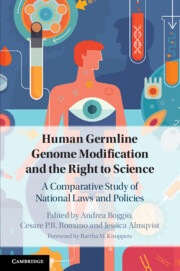 Human Germline Genome Modification and the Right to Science
Human Germline Genome Modification and the Right to Science from Part I - North America
Published online by Cambridge University Press: 15 November 2019
The aim of this chapter is to provide an overview of the constitutional and legal landscape in Mexico regarding healthcare and health research systems, in order to establish the potential implications for human genome engineering. In doing so, it first explores the recent constitutional changes in relation to the protection of human rights in the country and Latin America. It establishes that a progressive interpretation of the Mexican constitution in line with the international treaties on human rights signed and ratified by Mexico could be the way forward in permitting basic and applied health research, specifically via using CRISPR/Cas to modify the human germline genome for the benefit of human health. Due to the fact that the existing legal provisions in place are so fragmented and there is a lacuna regarding specific regulation of the human genome, it is feasible to propose that by applying a human rights purposive approach in favour of the right to freedom of science and right to be benefited from scientific progress, research on human germline genome editing should be legally possible. This is also supported by the case jurisprudence that has been developed by the Latin American Court of Human Rights regarding access to assisted reproduction technologies.
To save this book to your Kindle, first ensure no-reply@cambridge.org is added to your Approved Personal Document E-mail List under your Personal Document Settings on the Manage Your Content and Devices page of your Amazon account. Then enter the ‘name’ part of your Kindle email address below. Find out more about saving to your Kindle.
Note you can select to save to either the @free.kindle.com or @kindle.com variations. ‘@free.kindle.com’ emails are free but can only be saved to your device when it is connected to wi-fi. ‘@kindle.com’ emails can be delivered even when you are not connected to wi-fi, but note that service fees apply.
Find out more about the Kindle Personal Document Service.
To save content items to your account, please confirm that you agree to abide by our usage policies. If this is the first time you use this feature, you will be asked to authorise Cambridge Core to connect with your account. Find out more about saving content to Dropbox.
To save content items to your account, please confirm that you agree to abide by our usage policies. If this is the first time you use this feature, you will be asked to authorise Cambridge Core to connect with your account. Find out more about saving content to Google Drive.